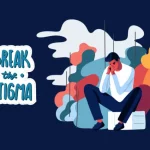
Image Credit: Pixabay
The dictionary definition of stigma is “a mark of disgrace associated with a particular circumstance, quality or person”.
It doesn’t matter if you’re a reformed criminal or a recovering addict, there is a stigma attached to these ‘conditions’.
The stigma is a result of a lack of understanding. Most people assume that people want to be addicted or that they are bad people. But the simple fact is that anyone can develop an addiction.
To understand more about how the treatment process works and addiction, in general, you can click here.
There are several consequences of stigma which affect everybody:
Economic Viability
The first issue is that those with the stigma will struggle to be accepted into employment opportunities. Being honest they will disclose an addiction or mental health issue.
Unfortunately, the lack of understanding will immediately close many doors, depriving the recovering addict of fulfilling a meaningful role in society.
In the process, the business may also lose out on a dedicated and skilled worker; to the detriment of the business and perhaps even the wider economy.
Feel Of Community
The community does not appear to mean as much today as it once did. Perhaps this is a result of the dramatic increase in social media and the use of smartphones.
However, in times of stress and difficulty, the community still bond together and deal with the issues. Unfortunately, the stigma attached to many conditions prevents addicts and other people from being involved.
In short, the community is afraid of what it does not understand.
Again this is a loss to the individual and the community, they may be recovering from an addiction but they still have valuable skills to offer.
Health Care
It is a sad symbol of the nation that health care for recovering addicts and people with mental issues is lacking.
As soon as the charts are read people believe that the patients are in a self-made situation and the best efforts will be wasted on them. This means that many people with stigma are offered substandard health care.
The issue is compounded for many of the sufferers by a difficulty in getting adequate health cover.
Loneliness
Being separated from society due to a stigma is a lonely experience. Yet these are the people who need support the most.
You’re probably aware of the heightened awareness of loneliness and its issues thanks to social media. Yet this is an issue that has been around for years; affecting those with stigma.
If you’re an addict and are unable to get a job, feel part of the community or make friends then you’re likely to relapse; because you’ll see no other option in life.
This is perhaps the worst of the consequences of stigma. Healthy people who want to make more of their lives are being deprived of the opportunity through fear and a lack of understanding.
Their subsequent relapse is simply an additional drain on the economy.
Discovering How To Fight Stigma
Fortunately, it is possible to beat stigma, but it will take an effort from everyone to achieve this. The solution centers around understanding the issues and accepting them. There are many things that can happen to anyone; no matter how much you believe it would never happen to you.
Here are some steps we can all be taken to beat stigma:
- Media Coverage needs to focus on what recovering addicts have achieved instead of sensationalizing mental illness or addiction.
- Awareness should be increased through informational campaigns. Politicians could be instrumental in implementing these campaigns. Knowledge really is power.
- Ongoing research can help us to understand the issues that face people and why they become ill or addicted to substances.
- More education by the mental health industry and recovery centers can help people understand the issues and get involved in the solution. Of course, this needs the backing of the government to enable the information to get to everyone.
The Bottom Line
There may be times when a stigma is justified but in general, the real issue is a lack of knowledge and fear. This is a powerful motivator to keep people away from you.
So the next time you see someone outside of what you would consider ‘normal’; pause and consider how they got that way. You’ll be surprised at how easily it could be you.
About The Author:
Jesse Hughes has carved out its niche in the Fitness and Health world with a dynamic, exuberant style, unfettered by fleeting trends and underpinned by a unique creativity.
Jesse believes that being healthy is a lifestyle. He offers everyday health and wellness advice. He believes that great looks is not just about what people see physically, but having a glow that radiates from within reflecting the health of the body.




